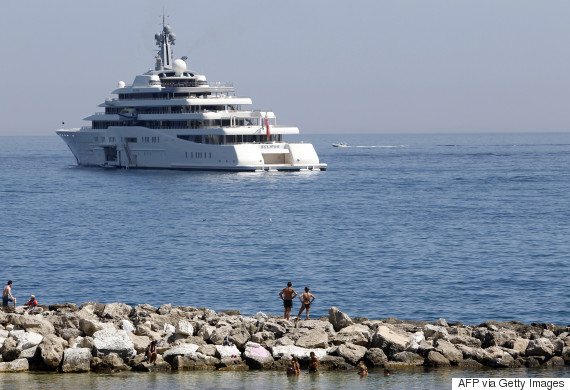
An unimposing brick building sits at 8-12 Welbeck Way in a narrow alley near Oxford Street. The Oracle Capital Group’s London headquarters is hardly impressive, boasting neither glittering glass facades nor golden door handles or any other bling. Whoever comes here does not want to attract any attention. On the contrary: The clients are looking for discretion.
These are the superrich, people who have so much money that their biggest worry in life is making sure that it’s being kept safe. Which is exactly what a wealth consultancy like Oracle Capital Group normally likes to see — in fact, as recent as 18 months ago, it would roll out the red carpet for them. But this group of rich have one distasteful disadvantage: They’re Russians. And it’s the wrong time to be a Russian oligarch abroad.
In the latest post-Crimea ripple, these particular Russian rich — who reaped their wealth by mining oil, gas, ore, or just Moscow establishment connections — have cash that in the eyes of many Americans and Europeans, could be tainted. That puts banks in a confusing purgatory: Regulators don’t know whether the money they’re touching has gone through the hands of organizations that the U.S. and Europe have placed sanctions on in the aftermath of the Ukraine conflict. And precisely because authorities are more vigilant than ever, banks can’t afford any error.
In short, no one wants to have much to do with Russia at all, says Jeffrey Mankoff, Russia/Eurasia expert at the Center for Strategic and International Studies, a Washington think tank. “It’s becoming increasingly isolated,” he says. That said, we’re not about to see a new Iron Curtain, which is ironic given the rise in the number of Russians who figure their fortunes would be better off abroad, says Richard Kauzlarich, a senior fellow in foreign policy at the Brookings Institution.
 A yacht, then the world's biggest, owned by Russian businessman Roman Abramovitch in Antibes' bay, southeastern France, on Aug. 22, 2011. (SEBASTIEN NOGIER/AFP/Getty Images)
A yacht, then the world's biggest, owned by Russian businessman Roman Abramovitch in Antibes' bay, southeastern France, on Aug. 22, 2011. (SEBASTIEN NOGIER/AFP/Getty Images)
But the new reactions rich Russians are facing are a departure from the cushy treatment many once enjoyed: In London, for instance, Oracle Capital Group once provided a One-Stop Package to especially desirable families. Staff members would help apply for British visas, pick out the right accommodations, recommend schools and manage the assets. And on the mainland, in Geneva, Swiss bankers have tended to take good care of their Russian clientele.
And for those seeing it firsthand, the increase is obvious — there’s been a “notable increase” in Russian clients, says Oracle Capital Group Chairman Martin Graham. The company's research also shows that Russian visa applications have spiked in the last year — more than 180 investor visas (the richie-rich ones), more than twice as many as were filed the year before. And this despite the fact that the price of investment visas has doubled from £1 million to £2 million.
The risk for companies like Oracle Capital Group is no laughing matter. American authorities take sanction infractions very seriously. For instance, French bank BNP Paribas had to pay a penalty of $9 billion the previous summer, following charges that it violated sanctions against Sudan and Iran, even though the transactions in question did not even take place on American soil. And, at least with regard to tax matters, Swiss banks have felt the long arm of the U.S. courts too. BNP Paribas could not be reached for comment.
So, Switzerland must be the answer for Russian money seeking a home, right? No luck. When it comes to EU sanctions, the Swiss government may not officially be obligated to comply — but the government in Bern, not wanting the country to serve as a bypass for finance deals that are outlawed by their most important trade partners, is de facto following all of the sanctions concerning the finance sector. New business deals with individuals or organizations on the EU sanction list are banned.
Is it all an unnecessary hullabaloo? “It’s a paradox situation: Many people want to come to London, but they are no longer welcome,” Oracle Capital Group’s Graham says. Guess the Brits don’t wanna see Russia from their houses.
CORRECTION: An earlier version of this article referred to Martin Graham as Oracle Capital Group's CEO. He is the company's chairman.